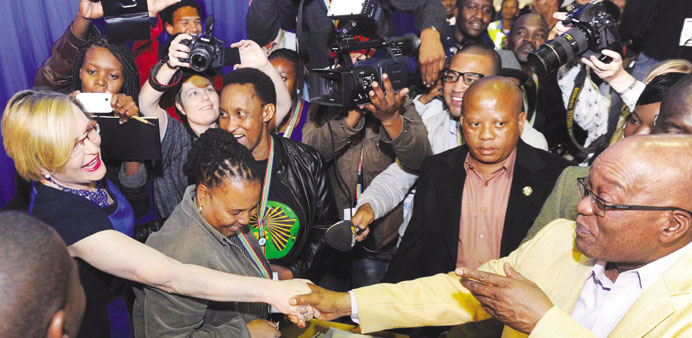A handout photograph made available by the South African Government Communication and Information System (GCIS) yesterday shows Zuma greeting DA leader Hellen Zille during his visit on Thursday to the IEC Results Operations Centre in Pretoria. The final results are due today.
AFP/Pretoria
South Africa’s ruling African National Congress (ANC) has shrugged off a slide in its support as results yesterday showed that it had won an overwhelming election victory, while the opposition hailed its own improved showing.
With few votes left to be counted, the ANC was on a little over 62% – down from more than 65% in 2009.
The Democratic Alliance (DA) had more than 22%– up from 17% in the last elections.
The DA also hung onto power in with an increased majority in the Western Cape, the only one of nine provinces not controlled by the ANC.
“Any party that gets over 60% of the votes, that party has massive, resounding support. So we’re not unduly worried about the loss of three percent or so,” said ANC spokesman Jackson Mthembu.
DA leader Helen Zille, whose party is accused by the ANC of representing the white minority and the elite, said the results proved its appeal was spreading among blacks.
“We grew by 1.1mn votes, of which 700,000 came from black South Africans,” she said at the national results centre in Pretoria. “So the argument that I still hear today ... that the DA has now reached it ceiling and cannot grow anymore, that argument, simply by the election results has been blown out of the water.”
The ANC’s victory nationally gives it a parliamentary majority big enough to hand embattled President Jacob Zuma a second five-year term.
But it has fallen short of the two-thirds majority needed to amend the constitution and has seen its winning margin reduced for a second consecutive election.
The party of liberation icon Nelson Mandela has been in power for 20 years since the end of apartheid and went into these elections amid a surge of discontent over government corruption and widespread poverty.
The real surprise was not that the ANC’s share of the vote dropped, but that it dropped so little, said political commentator Steven Friedman.
Analyst Moeletsi Mbeki said government social grants to pensioners, poor housewives and the unemployed – particularly in the rural areas – helped the ANC maintain its support.
“So for them whether the ANC is corrupt or not they see it as the party that delivers subsidies to them and welfare to them.
“And the ANC is always threatening them that if they vote for the DA they will lose their social welfare grants,” said Mbeki, of the South African Institute of International Affairs.
The populist Economic Freedom Fighters (EFF), formed by young firebrand Julius Malema last year after he was thrown out of the ANC, came in third with a little over 6% of the vote, which ensures they will have a presence in parliament.
Both DA and EFF support was bolstered by a series of corruption scandals surrounding Zuma and frustration at rampant poverty and poor public services.
But, voters appeared to put the storied party, credited with helping end white racist domination, before sullied president.
“There’s a strong critique of the ANC but in terms of available other options there is a lack of trust in other parties,” said Cherrell Africa, head of politics at the University of the Western Cape.
Public Enterprises Minister Malusi Gigaba told AFP that the ANC will use its fresh electoral mandate to “radically” boost black business.
“The fact of the matter is black South Africans continue to feel a sense of social injustice in terms of economic ownership patterns as well as the ownership of the land,” said the ANC number three, who is tipped to head the party one day. “We need to implement programmes that are going radically to change that.”
A record 25mn voters registered for the elections, with the electoral commission giving a provisional turnout figure of 73.26%.

